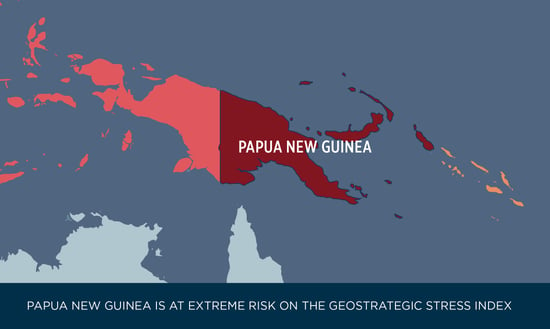The following analysis is part of Global Guardian's 2025 Global Risk Map and Geostrategic Stress Index (GSI), a predictive model that shows what countries are most likely to undergo a polycrisis in the next five years driven by geostrategic concerns. For more information, download and explore the 2025 Global Risk Map.
Current Situation
On 10 January 2024, Papua New Guinea (PNG) Prime Minister James Marape declared a 14-day state of emergency after riots and looting left at least 16 people dead and many others injured. The violence began in the capital, Port Moresby, following a pay cut imposed on hundreds of civil servants, including police officers, prison guards, and soldiers. Local reports have described the events as "the darkest day" in the nation's history. Papua New Guinea faces chronic instability, and high levels of violent crime. The country is marked by recent instances of rocky power transitions, election-related violence, and the presence of armed insurgents on Bougainville Island. Although the political situation has calmed following violent clashes during the 2022 general elections, the country's stability remains uncertain in the medium and long term.
Since around 2018, the South Pacific region has become one of the hotspots for Sino-Western competition due to its strategically important location and resources in the case of PNG. On 28 August 2024, the Pacific Islands Forum (PIF) endorsed the Pacific Policing Initiative that will create a multilateral Pacific police support group coordinated from Brisbane, Australia. The presence and training of police forces have become focal points of geopolitical rivalry in the region. In the past two years, China has signed a security agreement with the Solomon Islands and established police operations in Kiribati.
History
Papua New Guinea is the largest and most populous Pacific Island nation. PNG gained independence in 1975 from Australia and joined the Commonwealth. From 1988 to 1997, the island province of Bougainville experienced a violent secessionist conflict with the PNG government, resulting in 15,000 to 20,000 deaths. A ceasefire was reached in 1997, followed by a peace agreement in 2001, leading to the establishment of the Autonomous Bougainville Government in 2005. In a 2019 non-binding referendum, Bougainvilleans overwhelmingly voted for independence, and the Bougainville and PNG governments are currently negotiating a roadmap for autonomy, pending approval from the PNG parliament.
Threat Vectors
- Demographics: PNG is the third youngest country in the APAC region, with 96% of its population below age 65 and a median age of 22. This youth bulge strains social institutions and the labor market, thereby exacerbating social grievances among large numbers of unemployed disaffected youth.
- Corruption: Nearly half of the Port Moresby population live in unregistered housing without owning titles to their land. According to Transparency International, an overwhelming 96% of Papua New Guineans perceive corruption in the government as a significant issue, with 54% acknowledging they had paid a bribe for public services in the past year.
- Climate: Perennial environmental threaten Papua New Guinea. PNG is vulnerable to tropical storms, flooding, and landslides, which can cause significant damage. The country's emergency services are ill-equipped to handle large-scale natural disasters due to limited resources and inadequate training, further exacerbated by poor infrastructure. Located near an active seismic zone, Papua New Guinea is also prone to earthquakes that, if strong enough, could trigger tsunamis. Additionally, there are several active volcanoes across the country, with a concentration on New Britain island.
Industry Impact
Papua New Guinea has vast deposits of gas, gold, and minerals, and is strategically positioned along some of the Pacific region’s busiest shipping lanes. A breakdown in public order could disrupt economic activity in Papua New Guinea, particularly gold, copper, silver, nickel and cobalt mining and liquified natural gas (LNG) extraction. PNG is also a major producer of palm oil.
OutLook
- China's extensive infrastructure investments and vast demand for raw materials, combined with its regional ambitions and increasing economic ties to Papua New Guinea, Fiji, and Vanuatu, will strengthen Beijing's foothold in Melanesia, posing a challenge to the United States and Australia’s broader strategic influence in the South Pacific.
- PNG is a natural disaster or an election away from a polycrisis. As geostrategic competition over the Pacific islands heats up, the country’s resources and fragility will make it an attractive target for foreign influence campaigns.
Global Guardian's annual Risk Map displays country-specific security risk levels based on a series of indicators including crime, health, natural disasters, infrastructure, political stability, civil unrest, and terrorism.
This year's addition, the Geostrategic Stress Index (GSI), attributes a low to extreme categorical risk rating that forecasts the likelihood of a local crisis taking on regional or global dimensions as countries navigate new cold war relations.
To download your copy, complete the form below.




